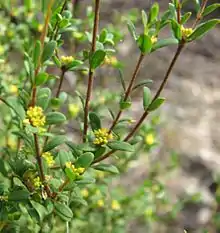Pimelea hewardiana
Pimelea hewardiana, also known as forked riceflower, is a shrub in the family Thymelaeaceae.[1] The species is native to western Victoria and south-eastern South Australia.[2] Plants are between 40 and 70 cm high and have leaves that are glabrous, narrow-elliptic and about 12mm long and 3mm wide.[3][4] They have blunt tips and arranged in opposite pairs.[4] Small, yellow tubular flowers appear between April and October in the species' native range.[3]
| Pimelea hewardiana | |
|---|---|
 | |
| Pimelea hewardiana Long Forest Nature Conservation Reserve, Victoria | |
| Scientific classification | |
| Kingdom: | Plantae |
| Clade: | Tracheophytes |
| Clade: | Angiosperms |
| Clade: | Eudicots |
| Clade: | Rosids |
| Order: | Malvales |
| Family: | Thymelaeaceae |
| Genus: | Pimelea |
| Species: | P. hewardiana |
| Binomial name | |
| Pimelea hewardiana | |
| Synonyms | |
|
Pimelea hewardiana var. elachantha Meisn. | |
The species is listed as "rare" on the Department of Sustainability and Environment's Advisory List of Rare Or Threatened Plants In Victoria.[5]
References
- "Pimelea hewardiana". Australian Plant Name Index (APNI), IBIS database. Centre for Plant Biodiversity Research, Australian Government, Canberra. Retrieved 16 April 2012.
- "Census of South Australian Vascular Plants Edition 5.00" (PDF). Botanic Gardens of Adelaide & State Herbarium. 2005.
- "Pimelea hewardiana Meisn". Flora of Australia Online. Department of the Environment and Heritage, Australian Government.
- Wild Plants of Victoria (database). Viridans Biological Databases & Department of Sustainability and Environment. 2009.
- "Advisory List of Rare Or Threatened Plants In Victoria - 2014" (PDF). Department of Sustainability and Environment (Victoria). Retrieved 29 June 2017.
This article is issued from Wikipedia. The text is licensed under Creative Commons - Attribution - Sharealike. Additional terms may apply for the media files.